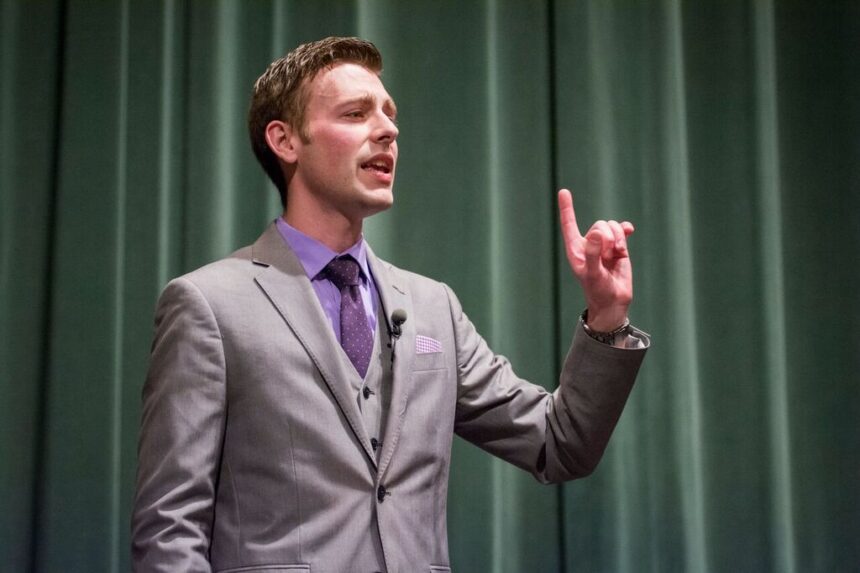Junior Jonathan Church presents his speech at the Edward Everett Oratory Competition Tuesday in Phillips Auditorium.
Anders Kiledal | Collegian
Junior Jonathan Church took first place at the annual Edward Everett Oratory Competition Tuesday, March 8.
Five finalists each delivered a ten-minute speech on the topic “Debate or Conversation? Liberty and Civility in Campus Discourse.” Freshman Ryan Murphy placed second, followed by freshman Joshua Hoover. The first, second, and third place winners received $3,000, $2,000, and $1,000, respectively.
Freshman Katie Hillery and senior Josiah Lippencott also competed. Senior Rachael Hille was the alternate, a sixth place finalist who would have performed had another competitor been unable.
“This year was one of the best I’ve seen,” said College President Larry Arnn, who has judged the competition since it began 16 years ago.
Arnn — along with educator, actress, and writer Jennifer Wiel and businessman and Republican Michigan State Rep. Eric Leutheuser — judged the essayists.
According to Professor of Speech Kirstin Kiledal, the flow of Church’s logic stood out to the judges.
Church, a finalist last year, opened his speech by reenacting the confrontation between an angry Yale student and professor Nicholas Christakis. Last fall, students verbally attacked the Yale professor after his wife suggested in an email that students should be able to choose Halloween costumes without administrative guidance.
Church argued emotion and appeals to force clouded the students’ argument. Using points from Alasdair MacIntyre’s “After Virtue,” Church explained that campus debate often degrades into protest because incompatible moral premises set up irreconcilable arguments.
Murphy structured her speech around the acronym TALK: target, advancement, liberty, and keep. She discussed the target of education, the advancement of education through free speech, the current state of liberty and how it has eroded, and keeping liberty and civility in campus discourse.
“I go to college to prepare for the real world, not to be coddled,” she said.
Kiledal said the judges liked the frame of her argument and the ease of her delivery.
Hoover emphasized the importance of avoiding character attacks but being willing to disagree with one another. Hoover’s sincerity impressed the judges, Kiledal said. To illustrate the importance of expressing unpopular truths, Hoover drew evidence from Saudi Arabian dissident and activist Raif Badawi.
“Today, we’re afraid. We’re afraid of words,” Hoover said. “That’s the truth.”
Nearly 70 students, speech finalists from the Hillsdale Academy, and others attended the competition.
During her entire speech, Hillery’s microphone made no sound. Many attendees were wondering why no one tried to fix the malfunction, Kiledal said.
Because you can’t replay a speech, it would have been disruptive to correct the problem once Hillery had begun speaking, Kiledal explained, adding that last year, a finalist wrenched his mic off after it continued to spike throughout his speech. Learning how to create control is part of the speaking process, she said.
“Katie handled it brilliantly,” Kiledal said.


